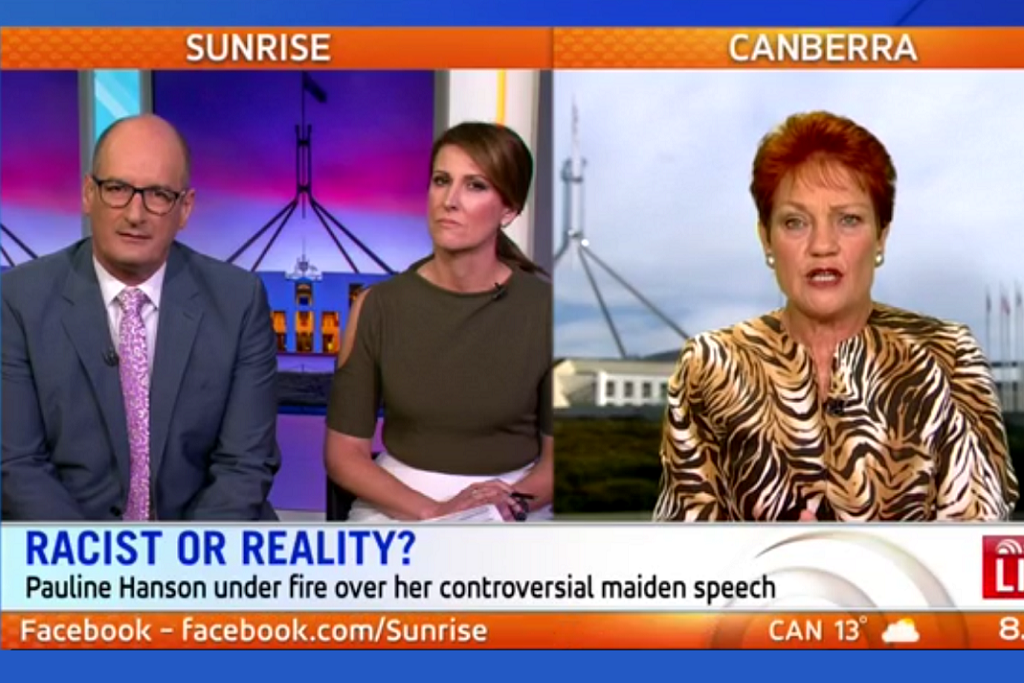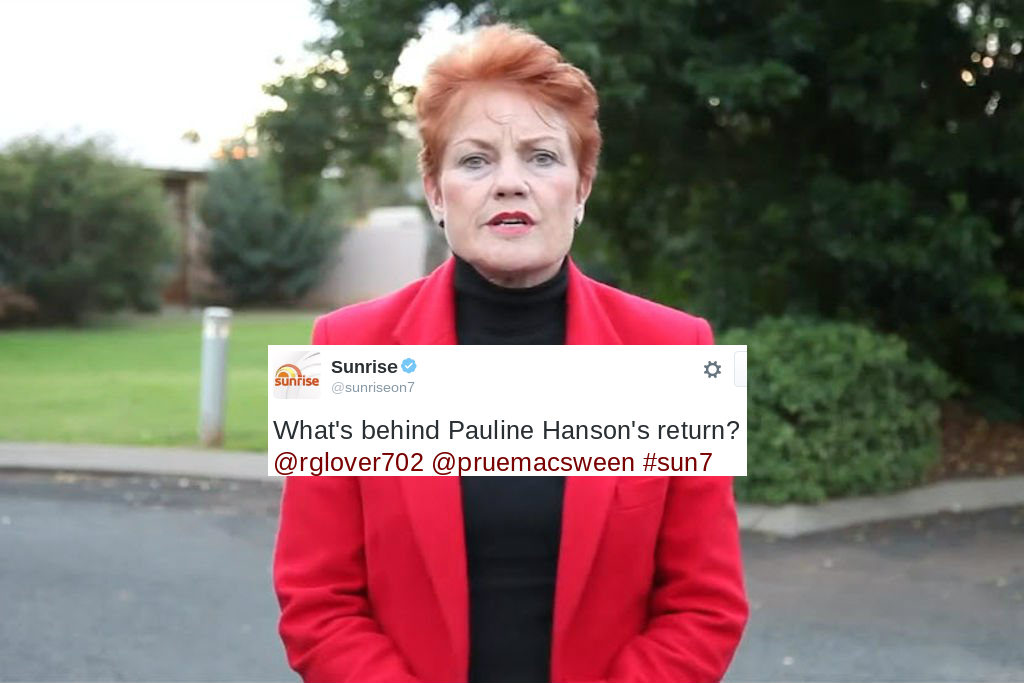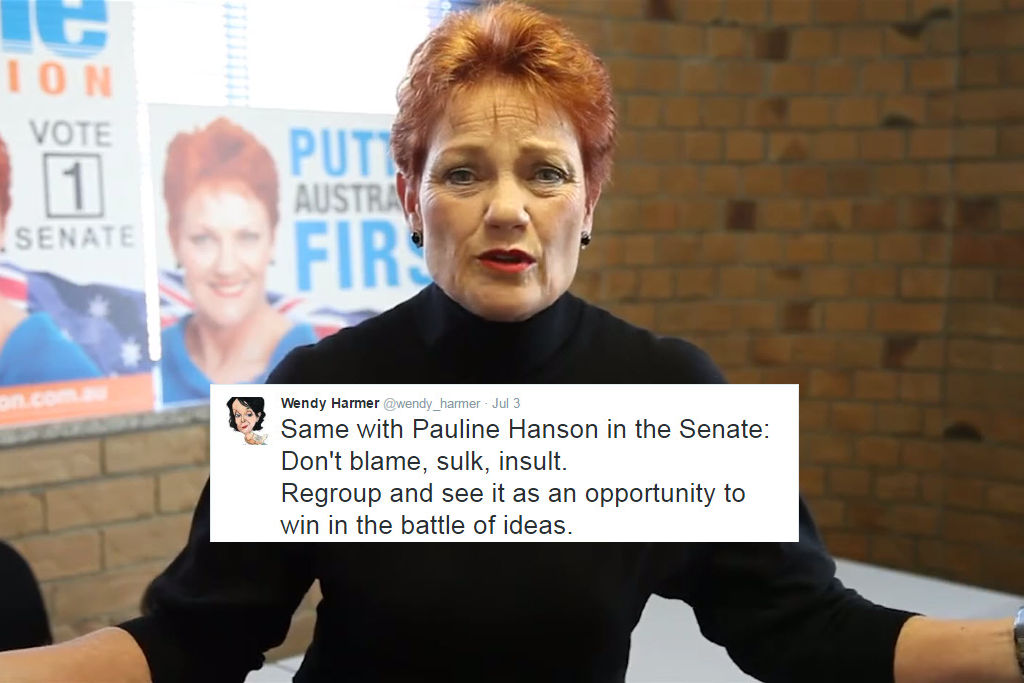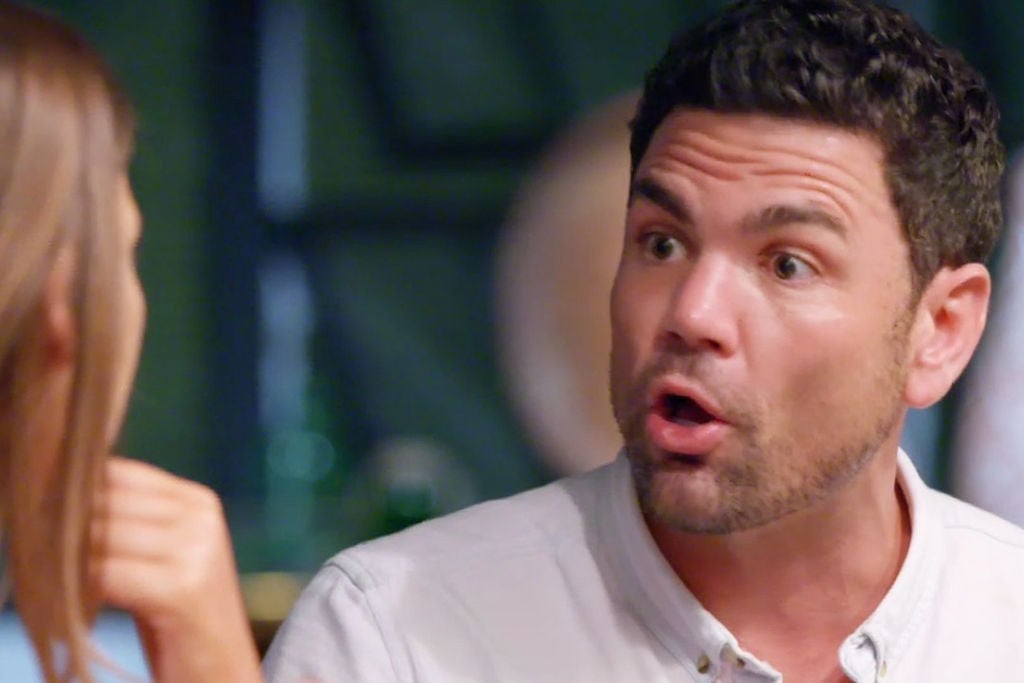From Pauline Hanson To Pete Evans: Commercial TV Has A Problem With Garbage Talk
What's the best way to deal with people like this?
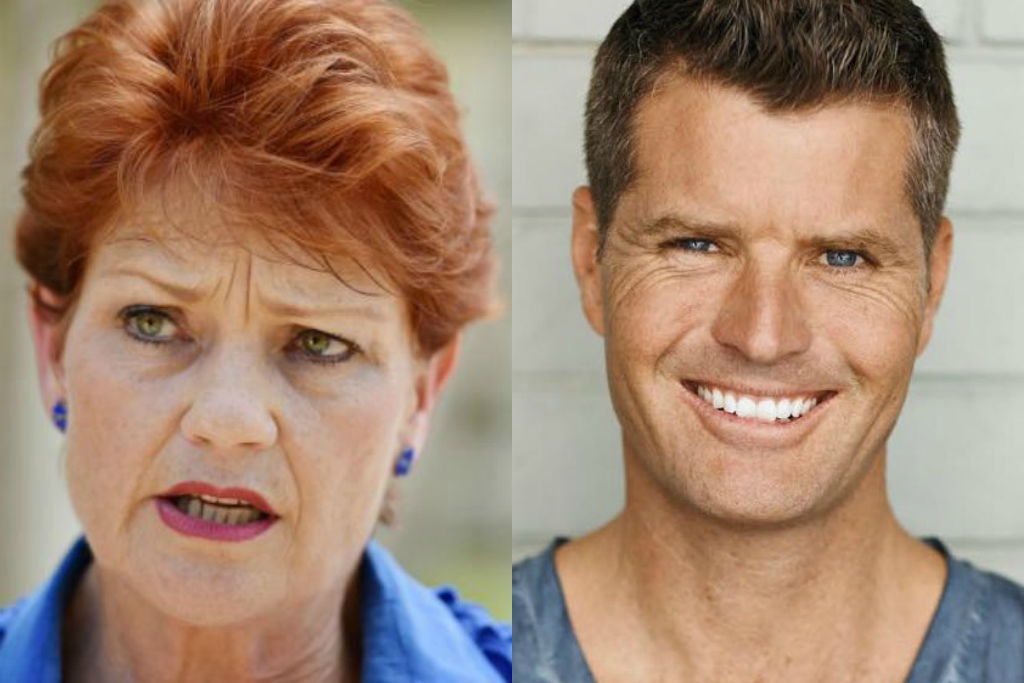
Whenever we cover Pauline Hanson here at Junkee we cop criticism from some of our readers — regardless of what the issue is or how we chose to write about it.
“Why are you giving her more attention?” and “You’re part of the reason she is becoming more popular!” are two of the most common responses. To be honest, I’m not really convinced by the argument that Junkee is to blame for the resurgence of One Nation and associated political racism in Australia, but it does raise some interesting questions.
The issue of how to report on incendiary politicians like Hanson — who has no problem making up her own facts — is a real one. It doesn’t just impact us, it’s a question for the whole media industry, particularly outlets that have an enormous reach and the ability to influence millions of people, like commercial TV networks. It’s something media organisations in the US have also been grappling with in the age of Donald Trump.
The challenge isn’t restricted just to politics. Last night on Channel Seven, paleo poster boy/sunblock truther Pete Evans was given the opportunity promote his new film and slam doctors questioning his anti-fluoride stance in the process. It’s just the latest example of Evans using his TV-built profile to dispense terrible and scientifically inaccurate advice.
But why do we see so much of Hanson and Paleo Pete on TV? What’s driving the non-stop coverage and is there a better way to cover high-profile personalities when they’re talking about sensitive issues in a garbage way?
TV’s Love Affair With Garbage Content
The support Hanson has received from commercial breakfast television is well-documented. Last year it emerged that Sunrise was actually paying Hanson to come on air and riff about immigration policy in the aftermath of terrorist attacks.
In the lead-up to last year’s federal election Hanson appeared on Sunrise half a dozen times to discuss vaccinations, education, housing, private health insurance, flag-burning and even Eddie McGuire.
Since the election, she’s mastered the art of making comments deliberately designed to invoke media interest, ensuring her party remains the centre of attention. But even though One Nation definitely receives a disproportionate amount of media attention (The Greens have three times the number of elected MPs, but you’ll very rarely see them on commercial TV), they are a party that influences the political agenda and their support is growing.
The problem with the current approach is that it’s largely uncritical. Networks don’t always care about fact-checking Hanson or presenting an alternate viewpoint. She brings in the ratings through controversy, and that’s often the priority.
It’s a model that’s worked well for reality TV too. Fairfax’s Debi Enker recently wrote about this in relation to Married At First Sight. “Back in 2015, MAFS was piously introduced as something akin to a community service — experts uniting lonely people — and a valuable social experiment,” she said. “Those days are long gone and all such pretence has been abandoned as MAFS has avidly courted sensation.”
“This year’s turbo-charged, expanded and extended version is bigger, longer, wilder. More couples, more tension, previously unheard-of partner-swapping, drunken group dinner parties, obnoxious and unrestrained in-laws. And it’s working.”
The commercial networks don’t always see it as their responsibility to provide an ethical or journalistic filter over what they present. Sunrise, after all, is an entertainment rather than news program. They’re just giving Hanson a platform. If other outlets want to pick up the story about her latest outrageous comments and debunk them, that’s even better from the network’s perspective.
It generates a “conversation” online, signal-boosting the show. The producers would be stoked, even if the articles covering the issue are negative, which they often are. Even when Sunrise did try and fact-check Hanson the awkward result was David Koch giving the impression he supported some of Hanson’s immigration policies.
The Pete Evans situation is a bit different, but the mechanics at play are basically the same. Evans is himself a reality TV host. The profile he’s built on My Kitchen Rules means that his infamous Facebook posts attract a huge amount of attention.
But at the same time, the show’s producers would chalk up Evans’ regular media appearances, as controversial as they are, as a win. It’s not a coincidence that the show Evans appeared on last night, Sunday Night — which led to the Australian Medical Association condemning his comments — airs on the same network as My Kitchen Rules.
Why are doctors experts in health? What are their qualifications? Pete Evans says #MKR #sundaynight Is he the kitchens Pauline Hanson ? pic.twitter.com/gE52w1EelO
— Aboriginal Health (@NACCHOAustralia) March 26, 2017
Sunday Night’s attempts to ‘balance’ Evans’ comments on sunscreen being toxic and dairy milk removing calcium from bones were embarrassing.
“That’s a pretty big statement to say dairy takes calcium from your bones,” Alex Cullen, the interviewer, said. I mean yeah, it is a pretty big statement. It’s also a pretty dumb statement with absolutely zero evidence behind it.
The show ended with a plug for Evans’ upcoming film, which gave the impression the whole segment was really just a long promo masquerading as journalism. That might be fine in another context; it’s what TV stations do. But when it’s about health and medicine, the sense at the end is that a network has decided to prioritise ratings and profit over public safety.
And in the case of Hanson? It’s prioritisation of ratings with a callous disregard of how poisonous our political debate can become, and the real-world implications of that on vulnerable communities.
What’s The Answer?
Even though there are similar motives driving the media embrace of Pete Evans and Pauline Hanson, they should actually be handled in very different ways.
Evans, in my view, should be dropped by the networks. He isn’t a politician who commands support from 10 percent of the population. He’s a TV chef who uses his profile to spout wild and dangerous conspiracy theories. Channel Seven knows this and they’ve decided that it works for them and My Kitchen Rules. It’s an absolutely cynical decision.
The world of commercial television is brutal. If Evans wasn’t a drawcard he would be dropped. It’s as simple as that. The network has decided it’s happy to keep promoting Evans despite his absurd statements because it benefits the show. His ideas don’t deserve debate and deconstruction (not that that’s what we’re getting now). If people really want to hear from him, they can check out his Facebook page.
The Hanson situation is quite different. A media blackout doesn’t work, nor is it warranted. Hanson and her party should be covered because they are a political party that wields substantial influence. The media has a responsibility to interrogate those policies and treat One Nation has they would any other party.
Occasionally the commercial networks have tried to do this. Channel Nine’s deeply weird and short-lived debate show The Verdict featured Hanson as a guest. The panel (which, for full disclosure, I was on) were given the opportunity to refute her arguments on Muslim immigration and how to combat radicalisation.
The format of TV debate shows, geared around controversy, are far from ideal but Hanson was a weak performer and came off second best in her interactions with pretty much everyone. It wasn’t a perfect way to discuss policy, but it was far, far better than inviting her on Sunrise the day after the Paris terrorist attacks to talk about a Muslim ban in front of sympathetic hosts.
No politician deserves uncritical coverage, and no one gets it the way Hanson does. It’s not hard to point out how her arguments and policies don’t actually make any sense. If Malcolm Turnbull can do it, everyone else should be able to as well.
